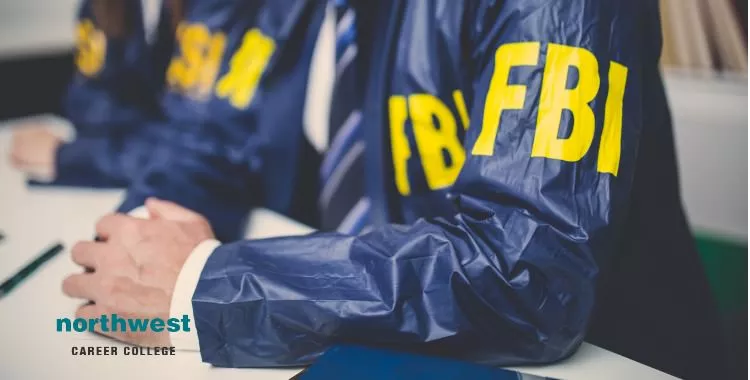A Brief History of the FBI
- Criminal Justice
- February 25, 2025
- 4.2k views
- 5 min read

The Federal Bureau of Investigation, or FBI, is arguably one of the most recognizable and iconic law enforcement agencies in the world. Inextricably linked to high profile crimes and the pursuit of famous gangsters and drug lords, the FBI has become a staple of crime fiction and true crime podcasts, books, and television shows.
In this article, we’ll be looking at the history of the FBI, from its founding in 1908 to come of the more infamous moments in its history.
Know More: Eight Blogs for Criminal Justice Students
Table of Contents
History of the FBI
The Founding of The FBI
The organization that would eventually become the Federal Bureau of Investigation was created when, on the 26th of July, 1908, U.S. Attorney General Charles Bonaparte ordered a group of newly hired federal investigators to report to Stanley W. Finch, the then Chief Examiner of the Department of Justice (DOJ).
The DOJ had been created in 1870 to enforce federal law and coordinate judicial policy but it lacked an investigative force of its own. In order to enforce the law, the DOJ often had to hire private detectives or borrow investigators from other federal agencies, such as the Secret Service.
In order to expand its investigative, the Department of Justice hired ten former Secret Service employees to join an expanded Office of the Chief Examiner, an office originally formed to review the financial transactions of the federal courts.
Interestingly, the Secret Service was originally formed by the department of the Treasury in 1865 to investigate counterfeiting, not to protect the president as it does today.
By March 1909, the force included 34 agents, and Attorney General George Wickersham, Bonaparte’s successor, renamed it the Bureau of Investigation.
Why the FBI Was Needed
The FBI was originally formed to prosecute criminals who had evaded punishment from state law by passing over state lines. Over time that mission transformed into enforcing a whole suite of federal laws and the number of FBI agents grew from ten to over 300 in less than a few years.
This increase in size and scope drew opposition from some members of Congress, who were concerned that the FBI could abuse this newfound power. Before any action could be taken to curb the FBI’s growth, the United States entered World War I in 1917 and the FBI was empowered to investigate draft resisters, violators of the Espionage Act of 1917, and immigrants suspected of working against the state.
The J. Edgar Hoover Years
In 1917 J. Edgar Hoover, then a lawyer and former librarian joined the Department of Justice. By 1919 he was the special assistant to Attorney General A. Mitchell Palmer and was instrumental in the FBI’s reaction to the so-called “Red Scare” of 1919 to 1920, where communism was seen as the greatest threat to America.
Hoover masterminded the plan to set up a card index system listing every radical leader, organization, and publication in the United States. By 1921, Hoover has amassed some 450,000 files which had resulted in the arrest of more than 10,000 suspected communists.
The Great Restructuring
With the perceived success of his reaction to the Red Scare, Hoover was appointed as acting director of the Bureau of Investigation n May 10, 1924, and set about drastically restructuring and expanded the Bureau, creating an efficient crime-fighting machine.
This included creating a centralized fingerprint file, a crime laboratory, and a training school for agents. The public profile of the FBI was helped by the successful capture or killing of high profile crime bosses such as George “Machine Gun” Kelly, Louis “Lepke” Buchalter, and John Dillinger.
World War II
During World War II, Hoover reused the anti-espionage techniques he had developed during the first Red Scare and these would carry over into his work with the House Un-American Activities Committee (HUAC) and Senator Joseph McCarthy and the creatin of COINTELPRO, a secret counterintelligence program that initially targeted the U.S. Communist Party but later was expanded to infiltrate and disrupt any radical organization in America.
While COINTELPRO was used to target dangerous groups such as the Ku Klux Klan it was also brought to bear against African American civil rights organizations and liberal anti-war organizations.
The fallout from the misuse of COINTELPRO from the media, the public, and Congress resulted in Congress passing laws requiring Senate confirmation of future FBI directors and limiting their tenure to 10 years.
Qualifying For Your Future
Gaining a qualification from our Criminal Justice School puts you in an excellent position to access a variety of employment opportunities as you look for one that suits your skills and interests. At Northwest Career College, our Criminal Justice instructors include licensed, practicing attorneys and degree instructors able to teach, not only the law but also to guide our students in the many ways a criminal justice graduate integrates into a Las Vegas legal profession.
As part of our Criminal Justice Program, you’ll visit courts, jails, meditation centers and more to experience first-hand the law in action which will make your criminal justice training applicable to the Las Vegas legal system. Northwest offers a flexible blended program with all criminal justice classes Las Vegas law classes taught on campus by an attorney and general education courses offered online. Our experienced instructors are on-campus to review and support your learning experience at all times.
Call us at (702) 403-1592 to speak to one of our enrollment team about joining our Criminal Justice Program today!



